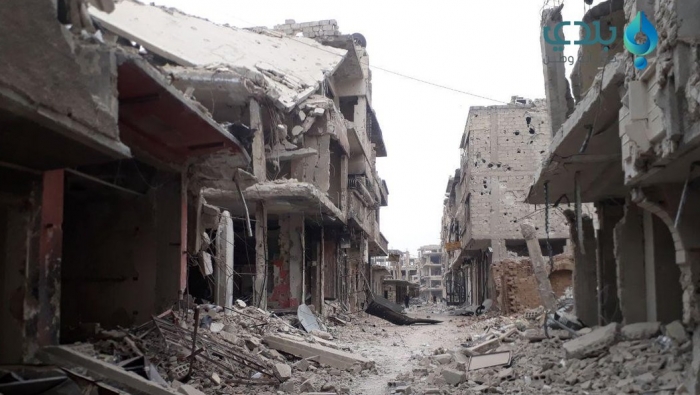Baladi - Coverage
This is the testimony of Um Mohammed; a kind 61 years old lady from Zamalka. Um Mohammed's kindness reflects of her face with its childish features. Her cheeks would still turn red when agitated.
Um Mohammed used to live in Zamalka, a town of Eastern Ghouta's. Zamalka fell out of the regime's control in 2012. Since then it has been subjected to a stifling siege, along with all the towns of Eastern Ghouta. Zamlaka endured continuous heavy shelling daily.
In this testimony, the forcibly displaced Um Mohammed talks about her home and family in Zamalka:
"I have three daughters and a son. My three daughters remained with me in Ghouta, while my son fled seven years ago. The siege deprived me the opportunity to attend his wedding, or to be with him when his son was born.
I lived in the family house. A very old house that my husband inherited from his father who inherited it from his father and so on. Generation after generation grew up in that house. Those of them who are still alive hold so many fond memories of it. "
"As shelling intensified during the last stretch since February," Um Muhammed continues, "it became impossible to leave the basements and go out to buy wood. The lack of proper ventilation in the basements and the dampness exacerbated the feeling of cold.
One day in that basement, as the shelling was burning the city, we had to use the furniture for heating. I will never forget that mad shelling that burned our memories and the memories of all those around us. It wiped any trace of us in Zamalka, our homeland, before we were completely uprooted.
The first pieces of furniture we burnt were the couches, and this was due to hunger. My grandchildren were hungry, and the extensive shelling prevented us from going outside to get wood. Even if someone would risk their life outside, there was no one selling anything in that hell. My son in law asked for my permission to break the couch to use its wood for cooking fire. I approved, but something inside me was shattered.
That couch carried a beautiful story. My husband bought it ten years after our marriage. He was so happy that we could afford it.
I might be able to restore material belongings, but the memories attached to them, how could they ever be recuperated?
The pain was greater when we had to set my bedroom furniture on fire. That bedroom accompanied me for 35 years, ever since I got married. It witnessed the best, and the worst days of my life.
Out of my kitchen utensils that survived the shelling, I burnt all the plastics because they were highly flammable and provided extra warmth. What was important was for my children and grandchildren to eat and feel some warmth.
Yet the hardest situation I had to overcome was taking the decision to burn my son's wardrobe. My son, whom I haven't seen for seven years.
Towards the end we even had to burn the doors of the house. My house, the family house, my children's house, was left widely open, exposed and violated."
Um Muhammed then continues describing the feeling when she was forced to leave Zamalka:
"Following the horrible shelling offensive during which the Syrian regime and Russian forces showed us hell, we were forcibly removed from Zamalka as broken refugees. It was impossible for us to live under the regime again. That regime that can detain my sons in law or drag them to military service. It was impossible especially knowing that my son would never go back to Zamlaka.
I left behind the family house and all the memories it nurtured. I left to Idlib with my daughters and their families, broken hearted. The one thing that offered me some consolation was that I was finally reunited with my son whom I didn't see for seven years and I held his son in my arms. The one thing that gives me hope is that I know I will tell my grandson all about his grandfather, his father and the family house with all the memories it nurtured."
Source: Global Voices

